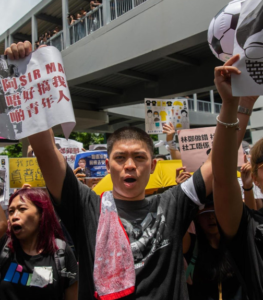Is Hong Kong set for a new exodus?
The political unrest gripping Hong Kong is set to contribute to rising emigration from the territory to countries like Australia, Canada and the US, observers say.
As the current protests – which originally stemmed from opposition to new laws allowing extraditions from Hong to China – grow and intensify, reports of Hong Kongers making plans to leave have risen sharply.
According to the Taipei Times newspaper, interest in emigration jumped after the extradition bill was announced in February.
Other reports indicate that many who were already planning to emigrate have accelerated their timelines for leaving.
Aside from Taipei, long-standing popular destinations for Hong Kong emigrants such as Australia and Canada could expect to see an influx of new arrivals.
The Financial Review has reported that number of Hong Kong citizens looking to move in Australia has risen sharply since the proposed extradition laws fuelled concerns about diminished civil liberties under Chinese rule in the city.
The paper cited migration consultants and property agents saying that wealthy Hong Kong residents were also looking to move assets to third countries such as Australia as an insurance policy against the introduction of proposed extradition laws, which would allow people accused of financial crimes.
Hong Kong also boasts one of the largest Canadian communities abroad, with 300,000 Canadians living in Hong Kong and nearly twice that number of Hong Kong residents living in Canada.
The migration pipeline between the two countries is largely a result of the 1997 handover of Hong Kong, where sovereignty of the territory was transferred from the U.K. to China.
Many residents feared what the inevitable transfer would mean for democracy and freedom in Hong Kong. These concerns sparked waves of migration in the early 1990s to places like Vancouver and Toronto, with many of the migrants becoming Canadian citizens.
Meanwhile, Taiwan President Tsai Ing-wen says her administration will consider granting Hong Kong protesters asylum based on humanitarian concerns,
But obtaining precise data on how many Hong Kongers are emigrating is difficult because the government does not keep those numbers.
And many of the city’s wealthier citizens – including politicians and business leaders – already have dual passports, a legacy of 1997 when scores snapped up British, Canadian, American and Australian passports.
But anecdotal evidence suggests a steady drain of talent away from the city in the last decade – a period that has seen public anger build over rising inequality, eye-watering property prices and fears Beijing is trying to undermine Hong Kong’s unique freedoms and culture.
Hong Kong migration consultant John Hu has told local media there were two distinct recent periods where emigration spiked: the lead up to the handover and after the failure of the 2014 “Umbrella Movement” pro-democracy protests to win any concessions.
The extradition bill has prompted “a third wave”.
“The rate of inquiries rose nearly 50 percent after the bill was announced in February, Mr Hu said. “When the people went onto the streets to protest, it rose even more”.
In recent days, the protests have morphed into a broader expression of frustration over China’s growing influence in Hong Kong
Since June 9, more than a million protestors, according to some sources, have taken to the streets to protest the extradition laws.
Although Hong Kong Chief Executive Carrie Lam suspended the bill on June 16 and called it “dead,” it has yet to be formally withdrawn, and protests of an increasingly hostile nature continue.
A former British colony, Hong Kong became a semi-autonomous special administrative region of the People’s Republic of China in 1997.
The territory is governed under the “one country, two systems” principle, which gives it a certain degree of autonomy from China in its political, judicial, and economic systems.
Yet, Beijing has increasingly sought to exert more control over Hong Kong, and popular unrest has occasionally boiled over—most recently in 2014 during the so-called Umbrella Movement, when more than 100,000 demonstrators protested mainland China’s attempts to limit the candidates Hong Kongers could vote for in their 2017 elections.
Yet, political unrest is not the only factor driving Hong Kongers to consider emigration.
The extremely high cost of living in the city, its high pressure education system as well as cramped living conditions due to high population density, are also push factors.
According to a survey carried out by the Chinese University of Hong Kong and released in early 2019, a third of respondents said stated they would emigrate “if they had the chance”.
The desire to leave was particularly high among young people ages 18-30 (51 percent) and the university educated (48 percent).
In the same survey, respondents intending to leave cited “too much political dispute” and “overcrowded living conditions” as top reasons.
More living space, cleaner air, and better conditions for human rights were key attractions of life in a new country.












